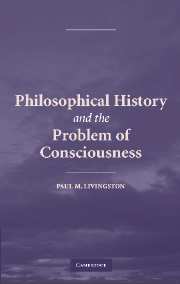Book contents
- Frontmatter
- Contents
- Preface
- Acknowledgments
- 1 Introduction: Philosophical History and the Problem of Consciousness
- 2 Structuralism and Content in the Protocol Sentence Debate
- 3 Husserl and Schlick on the Logical Form of Experience
- 4 Ryle on Sensation and the Origin of the Identity Theory
- 5 Functionalism and Logical Analysis
- 6 Consciousness, Language, and the Opening of Philosophical Critique
- Notes
- Works Cited
- Index
5 - Functionalism and Logical Analysis
Published online by Cambridge University Press: 16 July 2009
- Frontmatter
- Contents
- Preface
- Acknowledgments
- 1 Introduction: Philosophical History and the Problem of Consciousness
- 2 Structuralism and Content in the Protocol Sentence Debate
- 3 Husserl and Schlick on the Logical Form of Experience
- 4 Ryle on Sensation and the Origin of the Identity Theory
- 5 Functionalism and Logical Analysis
- 6 Consciousness, Language, and the Opening of Philosophical Critique
- Notes
- Works Cited
- Index
Summary
Thirty-five years after its initial development, the functionalist theory of mind today remains the most popular general position on consciousness among analytic philosophers and scientists alike. The functionalist theory has remained popular, in large part, because it seems to integrate a plausible empirical research program for the investigation of the mind with a wholly physicalist or materialist ontological outlook. But although it is often presented as a metaphysical or empirical position on the nature of the mind, philosophical history shows that functionalism is in fact the latest and most consistent application of an essentially semantic structuralism to the theory of mind. Both in its underlying method and in its fund of decisive arguments, functionalism makes detailed and essential use of reflection on, and reasoning about, the logical and semantic form of language about immediate experience and states of consciousness. Like other theories before it, though, it interprets this reasoning about the language of consciousness as part of an overall theory of mind that explains consciousness by locating it within a total pattern of logical and causal relations.
Viewed in the perspective of philosophical history, the problem of explaining consciousness, as it is currently discussed, arises primarily from the recurrent resistance of consciousness to structuralist programs of explanation. Philosophical history shows the origin of the functionalist theory of mind in a structuralist program of semantic analysis and thereby shows its continuity with the older forms of structuralist explanation we have explored in earlier chapters.
Information
- Type
- Chapter
- Information
- Philosophical History and the Problem of Consciousness , pp. 151 - 194Publisher: Cambridge University PressPrint publication year: 2004
